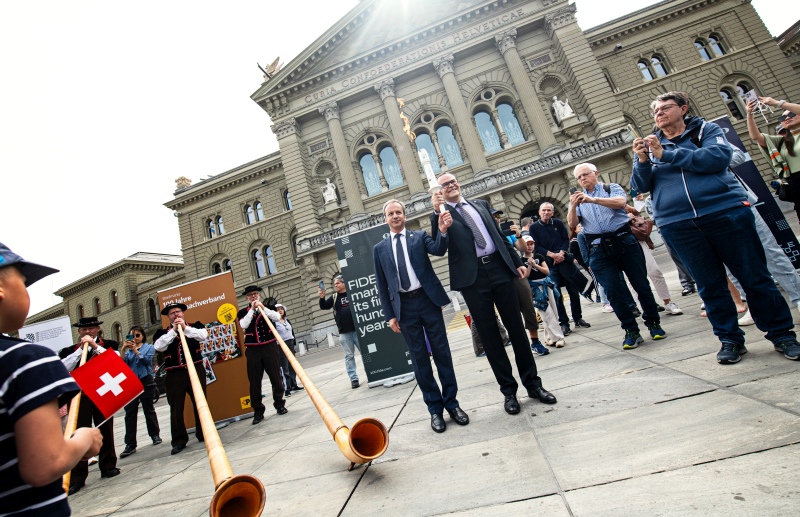
In a vibrant series of events involving Swiss chess players, children, politicians, government officials and people from all walks of life, Switzerland celebrated the 100th anniversary of FIDE with elegance and enthusiasm, staying true to the spirit of the game and its universal appeal
Switzerland is a country with a significant chess history. As the official seat of FIDE (located in Lausanne), it holds a prestigious position in the chess world. Additionally, the first treasurer of FIDE was Swiss, and the Swiss Chess Federation, founded 135 years ago, predates FIDE itself. The Swiss hosted two chess Olympiads (1968 and 1982), a world championship match, and numerous important chess tournaments. It was home to the great Viktor Korchnoi and is also known for the Swiss system tournament format.
Living up to its chess heritage and role as a home of the International Chess Federation, the Swiss threw a big party for chess on Sunday, April 7.
For the first time in the history of the Swiss capital, Bern, an Olympic-style ceremony unfolded – as the President of FIDE, Arkady Dvorkovich, carried the torch that lit the flame on the Bundesplatz, the central square in the city, in front of the Parliament Building – the seat of political power in Switzerland.
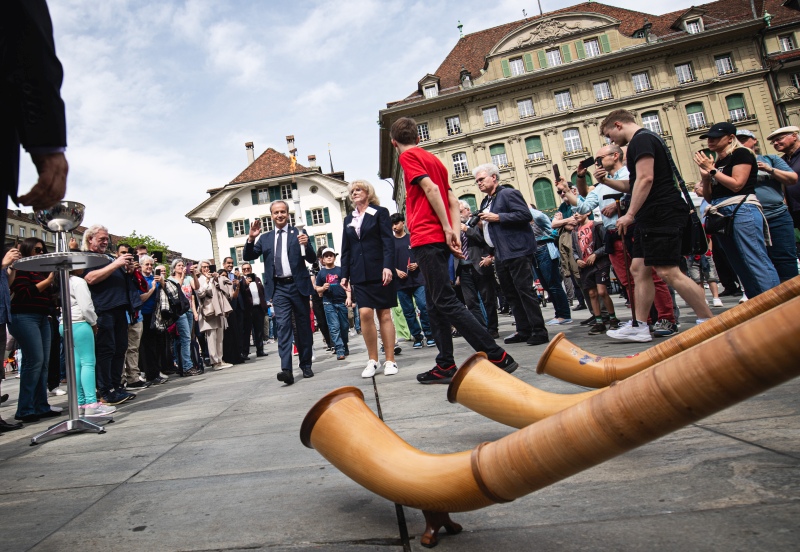
With the deep, melodious sound of the alphorn players, as if to announce Caissa’s descent from the Alpes, the torch was carried through the centre of Bern to the amazement of onlookers.
Arkady Dvorkovich thanked Bern, the Swiss Chess Federation, Swiss officials and all chess enthusiasts for “coming to the event and enriching this celebration”.
“We truly feel at home here in Switzerland, and we hope that this event will help get more people interested and involved in chess,” Dvorkovich said, thanking the Swiss Chess Federation for organizing the celebration.
The torch ceremony was the start of several special events that took place in Bern on the day.
The message from the President of the Swiss Federation
The celebration also included a greeting message by the President of the Swiss Federation, Viola Amherd who thanked FIDE for its “loyalty to Switzerland”, having maintained its office in Lausanne since its foundation in 1924.
Amherd wished everyone a “wonderful family celebration,” noting the FIDE motto “We are One Family” and adding: “We want the family to keep on growing”.
Swiss Post commemorative stamp
To commemorate the 100th anniversary of FIDE, Swiss Post (which is celebrating 175 since its foundation) issued a special 1st class stamp designed by Lausanne illustrator Catherine Pearson, which was presented on the Bundesplatz by the company’s director, Christian Levrat. A prominent Swiss politician for many years, Levrat is also a dedicated chess player.
In his address – “after a night spent watching the Candidates tournament in Toronto” – Levrat said that the stamp is “a testament to the rich history of FIDE”.
“Catherine Pearson created a stamp with vibrant colours that radiates joy. The geometric abstract chess pieces crisscross and intertwine, reminding us of the endless calculation of variants by sitting on the chess board. I believe it’s a great success, and I would like to thank the artist and the Swiss Chess Federation for their cooperation,” said Levrat.
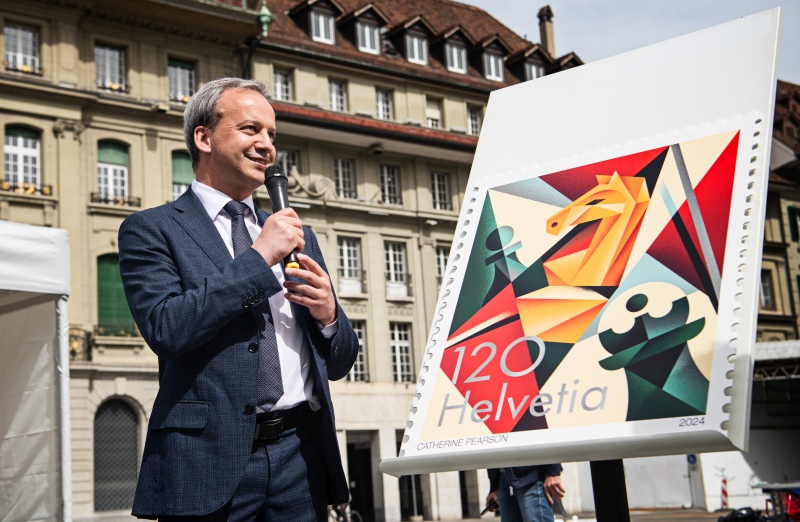
Thanking the Swiss Post for their gift, FIDE President Arkady Dvorkovich acknowledged the value of the gesture for the entire chess community, noting that “it is a beautiful stamp – modern but also showing history”.
“Both FIDE and the Swiss Post have the same task – to connect people. Now, the stamp belongs to the whole world. This is a huge present to the whole chess family and keeps the tradition of issuing post stamps that make chess visible to people around the world. Thank you,” said Dvorkovich.
This is only the second time that Switzerland has issued a chess stamp. The first one was issued in 1968 in celebration of the Lugano Olympiad.
Chess simul and banquet
True to chess tradition, the Bern celebration featured a chess simul on 32 boards, given by the former Women’s World Champion, Alexandra Kosteniuk and one of Switzerland’s greatest players – Werner Hug, who was the Junior World Champion in 1971, and Swiss champion in 1975.

The simul lasted 90 minutes, and the opponents proved tricky, as both Kosteniuk and Hug lost a game.
This was followed by a banquet for the FIDE and Swiss chess officials as well as distinguished guests, including the former World Champion Vladimir Kramnik and one of the leading world players in the 1980s, Artur Yusupov.
During the evening, Vladimir Kramnik gave a short speech in which he shared memories of chess in Switzerland from “many years and 20 kilograms ago,” including from the famous match between him and Peter Leko in 2004 in the scenic Swiss town of Brissago.
The Swiss way in chess: 50 years of youth chess and beyond
Chess is recognized as a sport in Switzerland and, in recent years, has seen an increase in public visibility thanks to the nation’s chess federation, which is currently headed by André Vögtlin – an economist and headhunter by profession – who also loves chess.
“The strategy of the Swiss Chess Federation is to increase the number of members because we have a demographic problem. We want to flatten the hierarchy of ages,” explains Vögtlin.
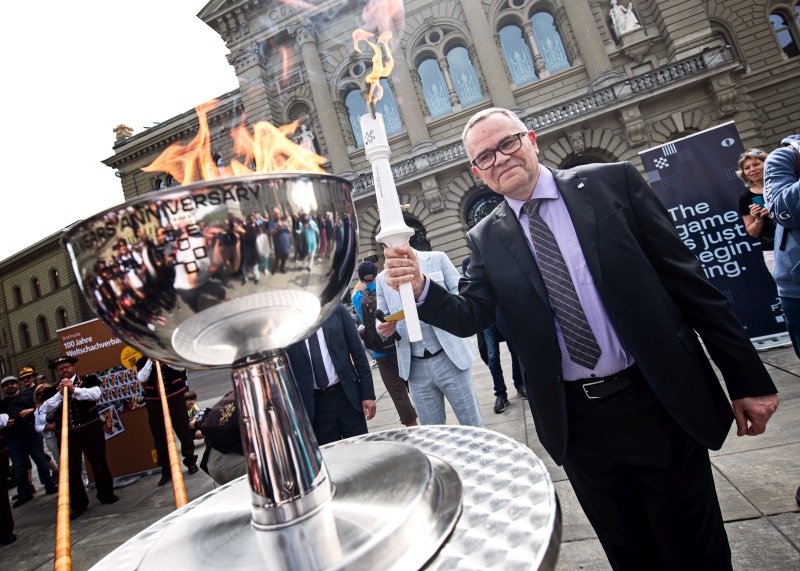
“I started a project named Generation Chess, and after we had an improvement of 20 percent in two years, we renamed the project to – The New Generation. With this in mind, we thought of taking part in the celebration of FIDE100 with a chess party. The party would not be just for us but the whole chess world, the chess people in Switzerland and the new chess generation everywhere,” he explains.
“We have worked for one year on this project, and we had a lot of support from FIDE, and we are happy to have pulled this off,” says the President of the Swiss Chess Federation, who is also active in several other chess initiatives – from chess for displaced children in Kenya, to FIDE’s attempt to set a Guinness world record in chess, to looking towards how football and chess can be more combined.
“Switzerland is a good place where we can initiate all of these projects and do a lot of work, so I am looking forward to the road ahead,” said Vögtlin.
Recognizing Vögtlin’s work, he was awarded a golden crown by the President of the Swiss Olympic [Committee], Jürg Stahl, who gave a speech praising the role of the Swiss Chess Federation in promoting chess in Switzerland.
Apart from celebrating 100 years of FIDE, the ceremony in Bern also commemorated 50 years since the founding of the Swiss Youth Chess Federation.
Addressing the guests of the celebration and the chess audience at Berns’ Hotel Bellevue Palace, Michael Hochstrasser, the President of the Youth Chess Federation, gave a concrete example of how chess can play a role in helping young people today.
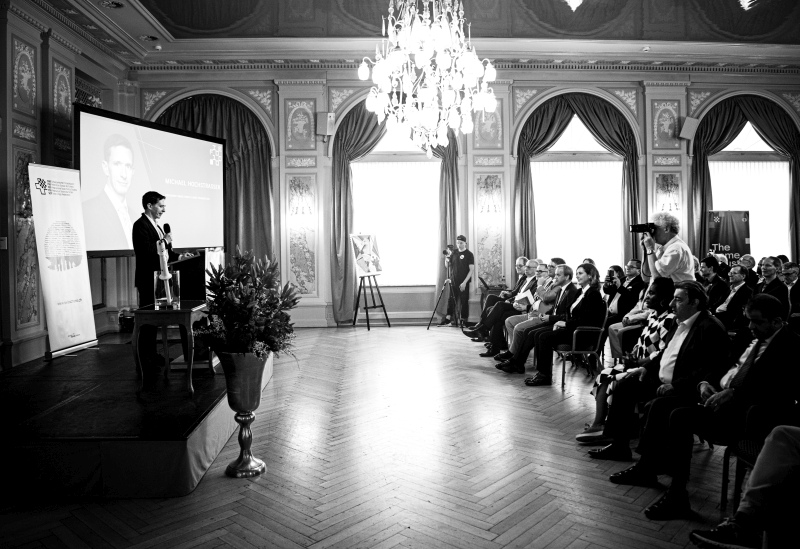
“Young people are exposed to too many distractions. Multitasking is a key word of our time. At the same time, young people are doing their homework, discussing the latest events at school while listening to music and writing social media posts. But what young people also have is more and more difficulties concentrating… By learning chess, children learn how to concentrate and fight distractions, but can also learn about analyzing their mistakes and analytical thinking”.
Hochstrasser pointed out another aspect of chess that is relevant to the world today and also has connections with the Swiss chess tradition.
Talking about Schwingen (or Swiss wrestling, which is considered a national sport in the country), Hochstrasser explained that the two opponents have the goal of throwing the other person to the floor with sawdust. “After the match, as a gesture of friendship and peace, the winner would wipe the sawdust off his opponent’s shoulders and back. In chess, we have a similar tradition – after the game, the winner and the loser will usually sit together and analyze the position and exchange ideas,” adding that today’s world can hugely benefit from this practice, encouraging opponents to talk even after disputes.
More chess in Bern
“We have never had such an event in Bern, nor Switzerland,” said Alec von Graffenried, the mayor of the Swiss capital.
He noted that the city has “the biggest number of public chess stalls in Switzerland,” and that it is planning to add more.
“I’m always impressed how chess can bring different generations, people and social classes together. That is exactly what we want to achieve for our city. The public chess boards in Bern are a great success and we will think of bringing even more of them, to get young people to play chess”.
Au revoir with a tango
The celebration of FIDE’s 100th anniversary concluded with a dinner, during which distinguished guests from FIDE and the Swiss chess community were honored with awards as a token of gratitude for their contributions and dedication to advancing chess.
FIDE President Arkady Dvorkovich expressed his appreciation to the organizers for their support and emphasized the significance of Switzerland as a “largely neutral country” and its value to the global chess community.
The ceremony culminated in a captivating tango performance, where music, laughter, and the spirit of friendship seamlessly blended together, echoing the essence of chess: We are all part of one Family.
Photos: Stev Bonhage